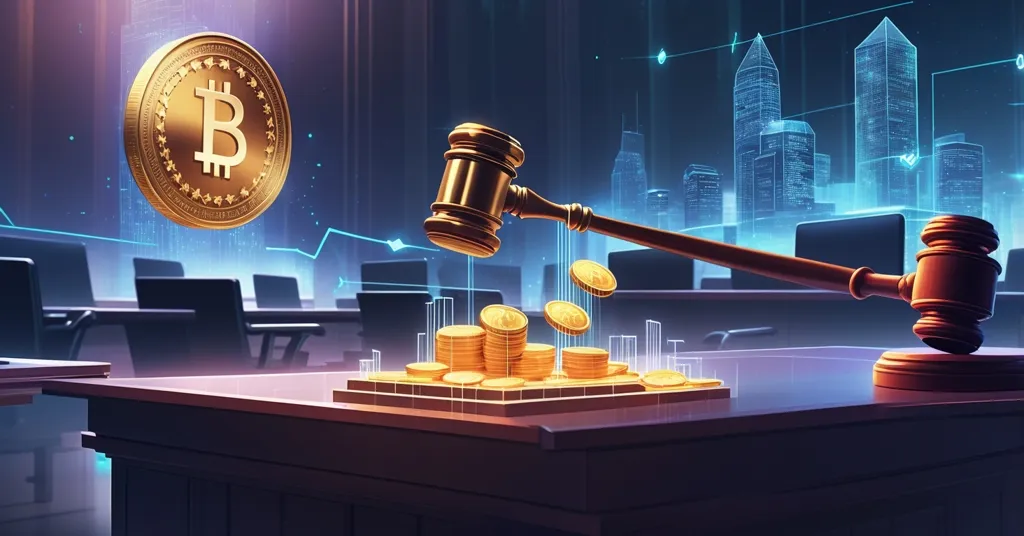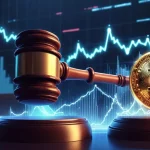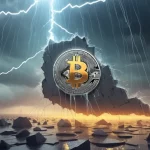Ripple-SEC Lawsuit Nears Finale: Key Letter to Judge and XRP Price Jumps 6%

Ripple vs. SEC Lawsuit Nears End: Letter to Judge Torres and XRP Price Surge
The protracted legal clash between Ripple and the U.S. Securities and Exchange Commission (SEC) is finally showing signs of resolution, with a recent letter to Judge Analisa Torres marking a significant procedural step. After nearly four years of courtroom battles over the classification of XRP, both parties seem ready to put this saga behind them—though a few stubborn hurdles remain before the finish line.
- Letter to Judge Torres requests removal of a key witness, hinting at case wrap-up.
- Judge denies motion for swift closure despite settlement talks and reduced penalty.
- Ripple and SEC drop appeals as XRP price jumps 6% amid market optimism.
Latest Procedural Moves in the Ripple-SEC Battle
Since December 2020, Ripple has been embroiled in a high-stakes fight with the SEC, which claims the company conducted an unregistered securities offering worth over $1.3 billion through sales of XRP, its native cryptocurrency. For clarity, a securities offering is akin to selling unregistered stocks—something the SEC argues Ripple did without proper regulatory approval. This lawsuit isn’t just about one company; it’s a litmus test for how digital assets are governed in the U.S., with ramifications for the entire crypto industry. For more background on the case, check out the detailed overview on Ripple Labs’ history and legal battles.
The latest twist comes via a letter from Andrew Kunsak of Sidley Austin LLP to Judge Torres, requesting the removal of an investment banker declarant—a financial expert witness providing testimony—from the court’s docket. This individual joined the case in August 2023 to offer expert insights and protect stakeholder interests. Kunsak, who is leaving the firm, underscored the limited scope of this move, stating:
“The confidentiality of their testimony is not an issue being appealed.”
Essentially, this is a routine “docket cleanup,” where a court docket—the official log of all case filings and proceedings—gets trimmed of irrelevant or completed elements before a final judgment. It’s a mundane but telling sign that the endgame is approaching, as highlighted in recent updates about Judge Torres receiving a key letter in the Ripple-SEC case. Yet, don’t mistake this for a done deal. Judge Torres recently denied a motion for an indicative ruling (a court signal on how it might decide if certain conditions are met), despite a proposed settlement and a push to lower the civil penalty to $50 million from the SEC’s initial, frankly absurd, $2 billion demand. While her exact reasoning isn’t public, it likely points to lingering procedural or substantive issues—perhaps unresolved questions about institutional XRP sales or settlement fine print—that must be ironed out first.
A Glimpse of Closure: Appeals Dropped, But Not Officially
Adding to the sense of progress, Ripple CEO Brad Garlinghouse confirmed that both Ripple and the SEC have agreed to drop their respective appeals in the 2nd Circuit Court, signaling a mutual desire to end this legal quagmire. His words carry a mix of relief and ambition, as covered in this analysis of Garlinghouse’s vision for the Internet of Value:
“We’re closing this chapter once and for all, and focusing on what’s most important – building the Internet of Value.”
For the unacquainted, the “Internet of Value” is Ripple’s grand vision: a global network where value—money, assets, you name it—moves as effortlessly as data does on today’s internet. Think cross-border payments zipping through faster than the clunky SWIFT system banks currently use. It’s a disruptive idea, potentially slashing costs and delays in traditional finance. But let’s pump the brakes—securities lawyer Marc Fagel notes that neither party has officially filed to dismiss their appeals yet. He estimates a one-to-two-month wait for the SEC to finalize its process, meaning we’re not out of the woods just yet, as detailed in updates on Judge Torres’ latest moves in the lawsuit.
Moreover, Ripple’s own history raises eyebrows. With significant control over XRP’s supply, critics argue it’s more centralized than the decentralized ethos we champion in crypto. Does the “Internet of Value” truly align with freedom and privacy, or is it just a polished corporate pitch? As much as we root for innovators over bureaucratic juggernauts like the SEC, Ripple’s early XRP sales did smack of a cash grab with a decentralized veneer. The truth, as often in this space, lies in the murky middle.
Market Reaction: XRP’s 6% Surge and Volatile Hopes
While legal filings drag on, the crypto market is already buzzing. XRP’s price surged nearly 6% in the past 24 hours, trading at $2.56, with a low of $2.41 and a high of $2.59. Trading volume also spiked by 23%, reflecting a frenzy of trader interest, as noted in this report on XRP’s price jump following SEC developments. Compared to past milestones—like the July 2023 ruling where Judge Torres declared XRP isn’t a security on public exchanges—this bump isn’t unprecedented, but it shows investors betting on a favorable outcome. Still, voices on platforms like Reddit’s XRP subreddit urge caution. One user snarked, “We’ve broken $2.58 resistance, but don’t mortgage your life on it holding.” Community discussions on XRP price and lawsuit updates echo this sentiment. It’s a sharp reminder that crypto markets are a rollercoaster—today’s pump can be tomorrow’s brutal dump.
Looking deeper, this volatility isn’t just noise. It mirrors the uncertainty of regulatory battles. A Ripple win could spark sustained confidence in XRP as a blockchain payment solution, while a harsh final penalty might tank sentiment overnight. Unlike Bitcoin, which largely dodges SEC scrutiny thanks to its decentralized roots, altcoins like XRP live under constant threat of the regulatory hammer. It’s why, as Bitcoin maximalists at heart, we see BTC as the safer bastion of financial freedom—yet acknowledge XRP’s niche in fast, low-cost transactions that Bitcoin doesn’t prioritize.
Ripple’s Vision vs. Decentralized Ideals
Garlinghouse’s focus on the “Internet of Value” post-lawsuit merits a closer look. Through RippleNet, the company aims to revolutionize cross-border payments, leveraging XRP as a bridge currency to settle transactions in seconds, not days. It’s a stark contrast to Bitcoin’s store-of-value narrative or Ethereum’s smart contract playground. If successful, Ripple could carve out a real niche, disrupting the outdated systems of traditional finance. Imagine sending money overseas without the week-long wait or exorbitant fees—that’s the promise.
But here’s the rub: Ripple holds a massive chunk of XRP in escrow, releasing it periodically. This central control clashes with the pure decentralization we advocate through Bitcoin. Critics argue Ripple could manipulate supply to its benefit, undermining trust. So, while we cheer the disruption of status quo finance, let’s not blindly drink the Kool-Aid. True decentralization means no single entity pulls the strings—something Ripple struggles to embody. Could their vision still push effective accelerationism, hastening the adoption of blockchain tech? Possibly. But it’s a far cry from the untouchable autonomy of Bitcoin’s network. For broader community takes, see this Reddit discussion on XRP sentiment and market trends.
Regulatory Ripple Effects: A Precedent for Crypto
Beyond Ripple and XRP, this lawsuit is a battleground for the future of crypto regulation in the U.S. The SEC’s heavy-handed approach—demanding billions for what many see as ambiguous violations—feels like a shakedown aimed at stifling innovation. Their outdated frameworks barely grasp blockchain’s nuances, yet they wield them like a blunt club. If Ripple secures a favorable settlement, it might embolden other projects—think Cardano or Solana—to push back against similar SEC classifications of their tokens as securities. A harsh ruling, conversely, could chill the industry, forcing startups to flee overseas or shutter before they even launch. For perspectives on this broader impact, explore this Quora thread on the Ripple case’s regulatory implications.
Let’s play devil’s advocate for a moment. Some regulation isn’t inherently evil—scams and rug pulls plague this space, and a baseline of accountability could weed out bad actors. But the SEC’s sledgehammer tactics are overkill, often punishing legitimate innovators alongside fraudsters. Compare this to Bitcoin, where no central entity exists to sue, leaving regulators scrambling for relevance. This case could also nudge lawmakers toward clearer crypto legislation, a move we’d support under our effective accelerationism lens—provided it prioritizes freedom over control. The outcome here isn’t just Ripple’s fight; it’s a domino that could topple or prop up the next wave of decentralized tech.
Historical Context: SEC’s Broader Crypto Crackdown
This isn’t an isolated skirmish. The SEC has ramped up its war on crypto in recent years, targeting giants like Coinbase and Binance over similar unregistered securities claims. Ripple’s case stands out due to its duration and the partial win in July 2023, when Judge Torres ruled XRP isn’t a security on public exchanges—a decision that gut-punched the SEC’s narrative. Yet, their persistence with massive penalties shows a refusal to adapt to blockchain’s realities. This pattern of overreach fuels our skepticism of centralized authority and reinforces why decentralization, as embodied by Bitcoin, remains the ultimate shield against such meddling. Ripple’s fight is one battle in a larger war for the soul of digital finance.
Key Takeaways and Questions
- What does the letter to Judge Torres signify for the Ripple-SEC lawsuit?
It marks a procedural step toward closure, as removing the investment banker declarant from the docket indicates their role as a witness is complete, tidying up before a final ruling. - Why did Judge Torres deny the motion for an indicative ruling?
Though specifics aren’t disclosed, it suggests unresolved procedural or legal issues persist, possibly tied to settlement details or past XRP sales, delaying an immediate end. - How does dropping appeals impact Ripple’s future?
It paves the way to focus on initiatives like the “Internet of Value,” though official dismissal filings are pending, with a potential one-to-two-month wait for SEC approval. - Is the XRP price surge a sign of lasting value?
Not reliably—the 6% jump and 23% volume spike reflect short-term optimism, but crypto’s volatility means gains can vanish fast, as community warnings highlight. - What broader impact could this case have on crypto regulation?
It may set a precedent for digital asset classification, either easing SEC pressure on other tokens if Ripple wins, or tightening the screws with a punitive outcome. - Does Ripple’s vision align with decentralization?
Partially—while it challenges traditional finance, Ripple’s control over XRP supply raises centralization concerns, diverging from Bitcoin’s pure decentralized ethos.
A Turning Point for Crypto?
As this legal marathon stumbles toward its end, the stakes couldn’t be higher—not just for Ripple or XRP holders, but for the entire blockchain ecosystem. A resolution here might redefine how we balance the raw, disruptive power of decentralized tech with the iron fist of regulation. Garlinghouse is itching to build the future, the market’s riding a wave of hope, but let’s keep our wits about us. Crypto’s history is littered with false dawns and regulatory whiplash. If Ripple emerges unscathed, does it unleash a flood of innovation, or just embolden centralized schemes cloaked in crypto jargon? Stay sharp, stay skeptical, and let’s watch how Judge Torres plays her final hand.



